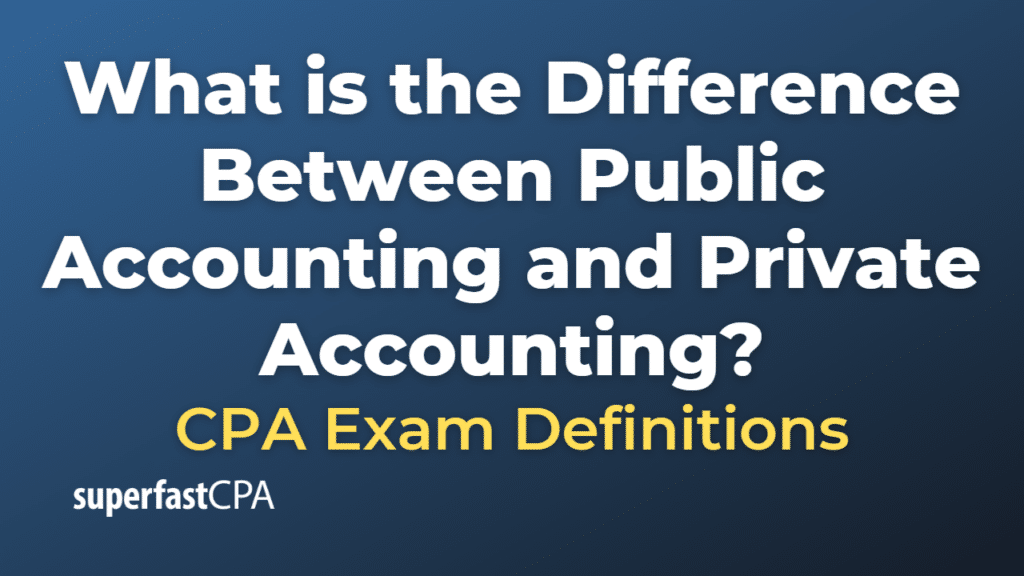Difference Between Public Accounting and Private Accounting
Public accounting and private accounting, also known as corporate accounting, are two different branches of the same field. Here’s a breakdown of the key differences:
- Scope of Work:
- Public Accounting: Public accountants provide services to multiple clients, which could include businesses, individuals, or government organizations. Their work often involves auditing, tax services, consulting services, and financial planning. They need to be very familiar with a wide range of accounting and tax regulations.
- Private Accounting: Private accountants work for a single company or organization. Their tasks include budgeting, financial statement preparation, internal auditing, financial planning, and cost accounting. They play a more integral role in the business’s daily operations and strategic planning.
- Certifications:
- Public Accounting: Most public accountants hold the Certified Public Accountant (CPA) designation, which involves passing a comprehensive examination and meeting certain experience requirements.
- Private Accounting: While private accountants can also be CPAs, many hold other certifications such as Certified Management Accountant (CMA), Certified Internal Auditor (CIA), or Certified Financial Analyst (CFA).
- Regulation and Reporting Standards:
- Public Accounting: Public accountants have to comply with Generally Accepted Auditing Standards (GAAS) and produce financial reports based on Generally Accepted Accounting Principles (GAAP) or International Financial Reporting Standards (IFRS). Their work is subject to external review and audit.
- Private Accounting: Private accountants also work with GAAP or IFRS, but their financial reports are primarily for internal use within the company. These reports help management make decisions and are usually not disseminated to the public or subject to external review.
- Career Progression:
- Public Accounting: Public accountants often start in junior roles and progress to become senior accountants, managers, directors, and partners within the firm. Many also use their experience in public accounting as a stepping stone to senior roles in private companies.
- Private Accounting: Private accountants often start as staff accountants and can move up to roles such as accounting manager, controller, or Chief Financial Officer (CFO).
- Work Environment and Lifestyle:
- Public Accounting: Public accountants often have more unpredictable and longer work hours, especially during tax season or the end of a business’s fiscal year. Travel may be necessary if clients are geographically spread out.
- Private Accounting: Private accountants usually have a more predictable work schedule and less travel. Their work is typically tied to the regular business cycle of their employer.
Each path has its own advantages and challenges, and the choice between public and private accounting often comes down to personal preference and career goals.
Example of the Difference Between Public Accounting and Private Accounting
Let’s look at two hypothetical examples to illustrate the difference between public and private accounting.
Example of Public Accounting:
John is a Certified Public Accountant (CPA) working at PwC, a large public accounting firm. His clients include various corporations, small businesses, and individuals.
During the tax season, he helps his clients prepare their tax returns, ensuring they are accurate and comply with tax laws. He also provides advice to minimize tax liability and plan for future tax situations.
For his corporate clients, he conducts audits, examining their financial statements to confirm their accuracy and compliance with regulations. These audits are vital for companies to assure stakeholders about their financial health.
John often works long hours, especially during the busy tax season and auditing periods. He also travels to various client locations for on-site audits. The variety of clients and industries keeps his job interesting but also challenging.
Example of Private Accounting:
Sarah is a Certified Management Accountant (CMA) working in the finance department of a tech start-up. Unlike John, Sarah doesn’t have multiple clients; her “client” is the company she works for.
She manages the company’s financial records, oversees accounts payable and receivable, and helps to develop budgets for different departments. Sarah also prepares internal financial reports to assist the management team in decision-making.
Sarah plays a crucial role in the strategic planning of her company, helping to analyze financial performance and forecast future revenues and expenses. Her job involves less travel and has more predictable working hours, but she is deeply involved in the daily operations and long-term strategy of her company.
In these examples, John’s job as a public accountant involves serving multiple external clients, while Sarah’s job as a private accountant is focused on serving one client—her employer.













